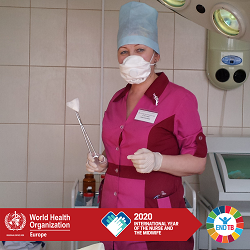Nurses in Russian Federation caring for TB patients

WHO
“I have worked as a nurse for patients with tuberculosis for quite some time and am glad to have seen an increase in recognition and respect for the nursing profession in recent years. It is rewarding to see patients recover from a severe and prolonged illness under our joint care and support,” says Svetlana Kozykina, a nurse specialized in nonpulmonary tuberculosis (TB).
“I enjoy being part of a team of like-minded people, where we are encouraged to develop our skills even further,” continues Svetlana, who works in Vyborg, in 1 of 5 hospitals located in the Leningrad Region, of the Russian Federation.
Health-care facilities in each of 18 districts of the region have TB outpatient units where patients receive all the necessary support, while staying in their own district.
“This people-centred care model dispenses with long-term isolation and allows for patients who do not pose a risk of infecting others, to receive treatment at home. Outpatient TB care, involving medical stations and rural medical units, enables patients to remain with their families, which in turn supports adherence to treatment,” explains Svetlana.
On the other side of the country, in north-eastern Siberia, the specifics of TB care in the Sakha Republic are defined primarily by its geography, extreme climate conditions, lack of regular transportation between many locations and low population density.
The main TB facility of the Republic is the Scientific and Practical Center for Phthisiology. Tatiana Stepanova, head nurse of the multidrug-resistant TB unit, has been working at the centre since 2004. Tatiana works with a research project, started in 2016, on providing TB care for patients suffering from alcoholism.
“‘Who, if not me, can care for them?’ This is the motto for nurses at our centre,” says Tatiana. “TB patients are often unable to work and have close contact with their families. They have no income or social life and may in addition struggle with alcoholism. This makes it especially rewarding when patients recover, are discharged from the centre, find a job and start their own family. Our main task is to provide directly observed TB treatment, which along with ensuring patients are getting drugs every day, implies having to follow strict infection control regulations, teaching the patient to accept the strict circumstances of the therapy, and of course being patient, supportive and kind.”



